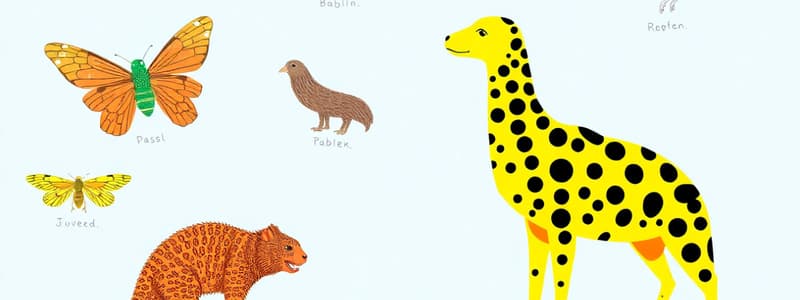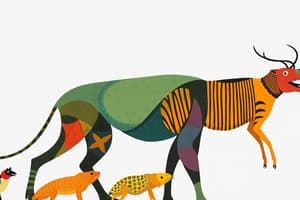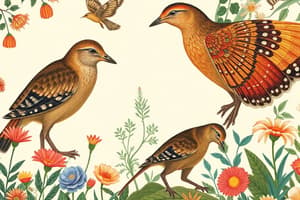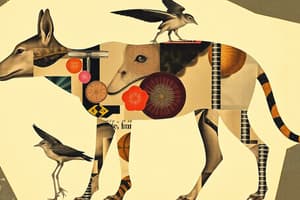Podcast
Questions and Answers
What do both humans and animals need for survival?
What do both humans and animals need for survival?
- Shelter (correct)
- Light
- Soil
- Space
Which of the following is NOT a characteristic of mammals?
Which of the following is NOT a characteristic of mammals?
- They produce milk for their young
- All mammals have feathers (correct)
- Mammals have fur or hair
- Mammals breathe through lungs
What distinguishes reptiles from amphibians?
What distinguishes reptiles from amphibians?
- Reptiles have moist skin
- Reptiles breathe through their skin
- Reptiles can live only in water
- Reptiles have dry, rough, scaly skin (correct)
Which animal is classified as a fish?
Which animal is classified as a fish?
Which group of animals is known to lay eggs?
Which group of animals is known to lay eggs?
Which animal group does a frog belong to?
Which animal group does a frog belong to?
What characteristic is NOT associated with fish?
What characteristic is NOT associated with fish?
Which of the following is a mammal?
Which of the following is a mammal?
What is a defining trait of reptiles?
What is a defining trait of reptiles?
Which classification includes animals that live both in water and on land?
Which classification includes animals that live both in water and on land?
What is the main purpose of classifying animals?
What is the main purpose of classifying animals?
Which of the following is NOT one of the main animal classifications mentioned?
Which of the following is NOT one of the main animal classifications mentioned?
Which option best describes a characteristic of mammals?
Which option best describes a characteristic of mammals?
What physical feature do reptiles typically possess?
What physical feature do reptiles typically possess?
Which of these animals is classified as an amphibian?
Which of these animals is classified as an amphibian?
What is a defining characteristic of amphibians?
What is a defining characteristic of amphibians?
Which of the following statements correctly describes mammals?
Which of the following statements correctly describes mammals?
What distinguishes insects from other animal groups?
What distinguishes insects from other animal groups?
Which group of animals always has backbones?
Which group of animals always has backbones?
What is a common feature of all birds?
What is a common feature of all birds?
Flashcards
Vertebrate Animals
Vertebrate Animals
Animals with a backbone.
Invertebrate Animals
Invertebrate Animals
Animals without a backbone.
Fish Characteristics
Fish Characteristics
Fishes have fins, tails, and gills.
Amphibian Characteristics
Amphibian Characteristics
Signup and view all the flashcards
Insect Characteristics
Insect Characteristics
Signup and view all the flashcards
What are vertebrates?
What are vertebrates?
Signup and view all the flashcards
What are invertebrates?
What are invertebrates?
Signup and view all the flashcards
Reptile's covering
Reptile's covering
Signup and view all the flashcards
Amphibian's skin
Amphibian's skin
Signup and view all the flashcards
What are gills?
What are gills?
Signup and view all the flashcards
Amphibian features
Amphibian features
Signup and view all the flashcards
Reptile features
Reptile features
Signup and view all the flashcards
Fish features
Fish features
Signup and view all the flashcards
Animal Groups
Animal Groups
Signup and view all the flashcards
Amphibian Life Cycle
Amphibian Life Cycle
Signup and view all the flashcards
Reptile Traits
Reptile Traits
Signup and view all the flashcards
Mammal Characteristics
Mammal Characteristics
Signup and view all the flashcards
Study Notes
Science Class Work Plan
- Routines
- Review
- Exploration Activity
- Lesson: Animal Groups
- Book Activity
- Wrap-up and 55
Review: Needs of Living Things
- Plants: air (carbon dioxide), space, water, light, soil
- Humans: air (oxygen), shelter, water, food
- Animals: air (oxygen), shelter, water, food
Big Idea and Essential Question
- Living things can be grouped
- How can you classify animals?
Explore Inquiry Activity
- Classify animals into groups
- Compare animal groups
- Explore animals that live on land
Lesson 1: Animal Groups
- There are thousands of different kinds of animals
- Animals are alike and different from each other
Animals with Backbones
- Fish
- Amphibians
- Reptiles
- Mammals
- Birds
Fishes
- Parts: fins, tail, gills
- Examples: puffer fish, milkfish, salmon
Amphibians
- Moist skin
- Examples: frog, salamander, caecilian, toad
- Baby amphibians live in water
- Adult amphibians can live on land
Reptiles
- Dry, rough, scaly skin
- Examples: alligator, turtle, iguana, cobra
Mammals
- Fur or hair
- Female mammals make milk for their young
- Examples: lion, pig, sheep
Birds
- Only animals with feathers
- 2 wings, a beak, claws
- Examples: bluebird, maya, eagle
Animals that lay eggs
- Birds, reptiles, fish, amphibians
Breathing
- Birds, reptiles, mammals: breathe through lungs
- Fish: breathe through gills
- Baby amphibians: breathe through gills
- Adult amphibians: breathe through skin
- Insects: breathe through spiracles (small holes)
Insects
- 6 legs, 2 antennae, may have hard outer shell
- Examples: beetle, dragonfly, cockroach
Other animals
- Stingray, platypus, gecko, humpback whale, frog, mosquito, boa constrictor, shark, sparrow, salamander, fly
Additional Information
- IXL Practice (identifying animals with and without backbones)
- Science Trivia website
- National Geographic Animals website
- Animal Classification Game
- Worksheet
- Animal Vocabulary
- Seatwork
Studying That Suits You
Use AI to generate personalized quizzes and flashcards to suit your learning preferences.




